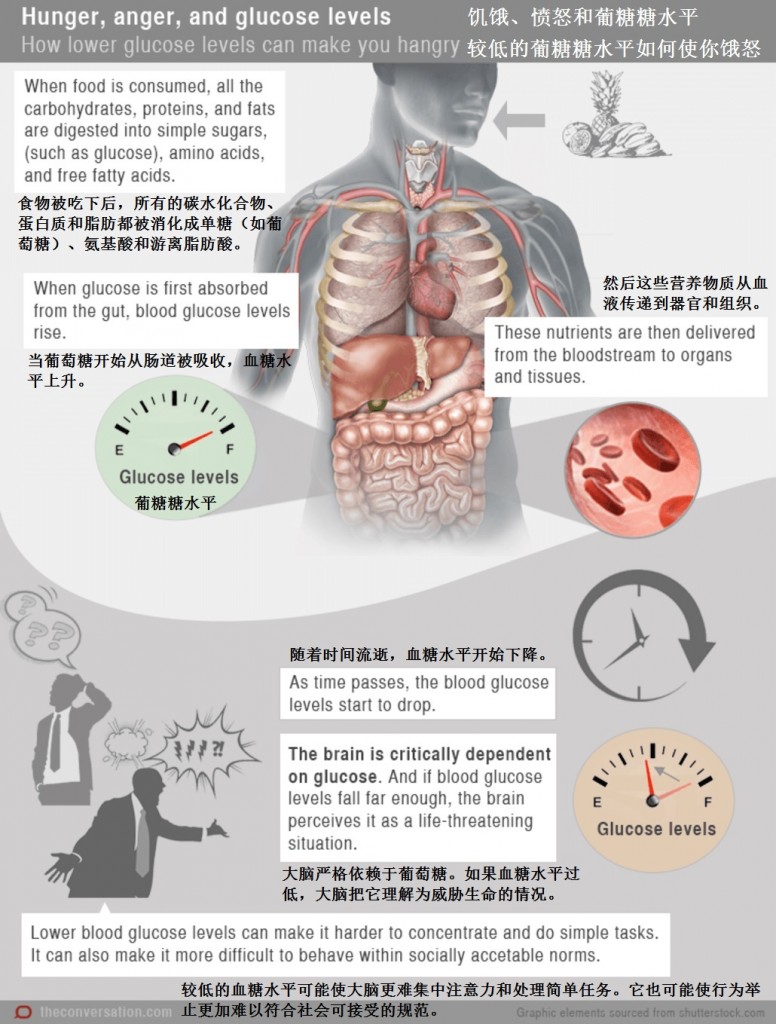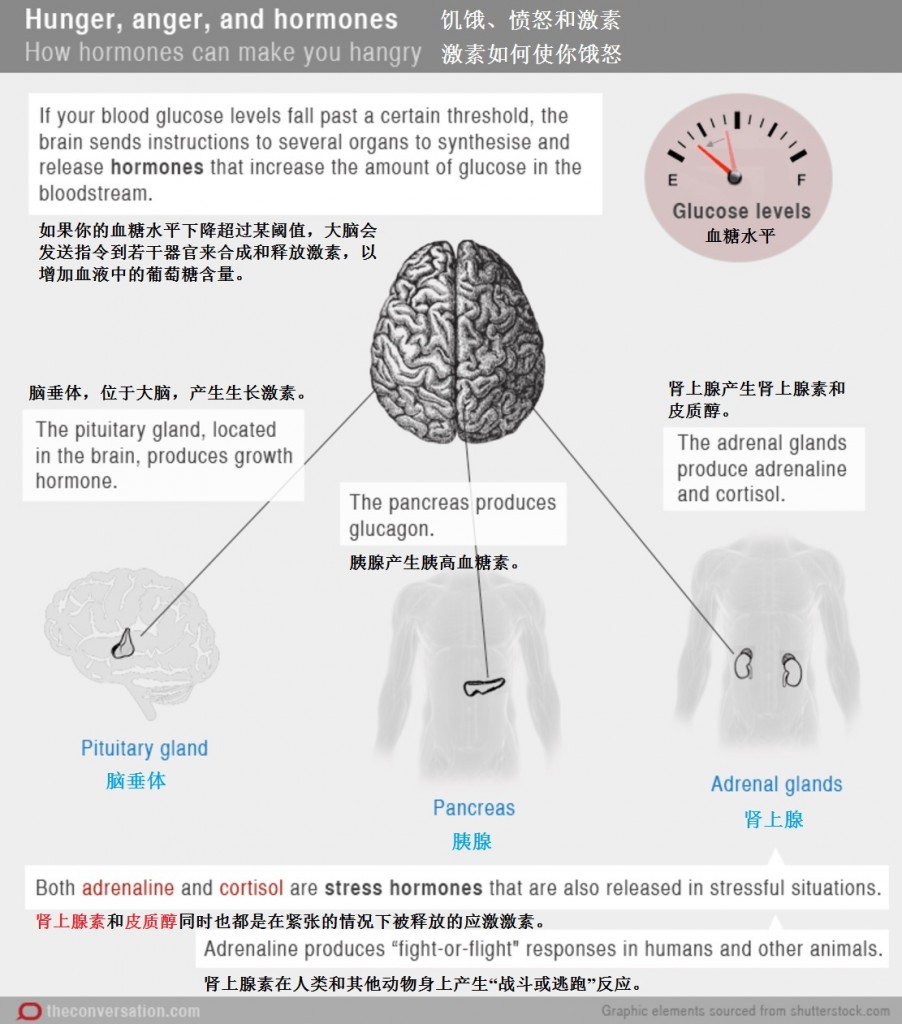Health Check: the science of ‘hangry’, or why some people get grumpy when they’re hungry
健康检查:“饿怒症”科学,或为什么有些人饿了以后会暴躁
There are many reasons why some people get very grumpy when they haven’t eaten for a while.
有些人一段时间没吃东西就变得非常暴躁,这有很多原因。
Have you ever snapped angrily at someone when you were hungry? Or has someone snapped angrily at you when they were hungry? If so, you’ve experienced “hangry” (an amalgam of hungry and angry) – the phenomenon whereby some people get grumpy and short-tempered when they’re overdue for a feed.
你曾在饥肠辘辘时愤怒地呵斥过某人吗?或者,你曾被某人在饥饿时愤怒地呵斥过吗?如果有,你就体验过“饿怒症”(一种饥饿和愤怒的混合体)——即有些人过了吃饭时间没吃东西就会变得暴躁易怒的现象。
But where does hanger come from? And why is it that only some people seem to get hangry? The answer lies in some of the processes that happen inside your body when it needs food.
但是饿怒来自哪里?为什么只是一部分人会饿怒?答案就在你身体需要食物时发生在体内的过程中。
The physiology of hanger
饿怒的生理学
The carbohydrates, proteins and fats in everything you eat are digested into simple sugars (such as glucose), amino acids and free fatty acids. These nutrients pass into your bloodstream from where they are distributed to your organs and tissues and used for energy.
你吃的所有食物中的碳水化合物、蛋白质和脂肪,都被消化成单糖(如葡萄糖)、氨基酸和游离脂肪酸。这些营养物质首先进入你的血液,然后从哪里被分配到你的器官和组织,并用作能量来源。
As time passes after your last meal, the amount of these nutrients circulating in your bloodstream starts to drop. If your blood-glucose levels fall far enough, your brain will perceive it as a life-threatening situation. You see, unlike most other organs and tissues in your body which can use a variety of nutrients to keep functioning, your brain is critically dependent on glucose to do its job.
在你上一次饭后,随着时间流逝,这些在你的血液中循环的营养物质的量开始下降。如果你的血糖水平过低,你的大脑就会把它理解为危及生命的情况。你知道,不像你体内的大多数其他器官和组织,它们可以使用种类繁多的营养物质来保持运转,你的大脑却严重依赖葡萄糖来完成其工作。
You’ve probably already noticed this dependence your brain has on glucose; simple things can become difficult when you’re hungry and your blood glucose levels drop. You may find it hard to concentrate, for instance, or you may make silly mistakes. Or you might have noticed that your words become muddled or slurred.
你可能已经注意到了这种大脑对葡萄糖的依赖;当你饿了,身体的血糖水平下降,简单的事情也会变得困难。比如,你会感到注意力难以集中,或者可能犯一些低级的错误。或者你可能已经注意到,你说话变得混乱而含糊不清。
Another thing that can become more difficult when you’re hungry is behaving within socially acceptable norms, such as not snapping at people. So while you may be able to conjure up enough brain power to avoid being grumpy with important colleagues, you may let your guard down and inadvertently snap at the people you are most relaxed with or care most about, such as partners and friends. Sound familiar?
当你饿了,可能变得更加困难的另一件事情是行为举止符合社会可接受的规范,比如不呵斥人。虽然你可能唤起足够脑力来避免和重要同事相处时出现暴躁,但是在对待如伴侣、朋友等最令人放松或者最在乎的人时,你可能放松警惕,无意识地呵斥他们。是不是听起来很熟悉?
Another bodily response
另一种身体反应
Besides a drop in blood-glucose concentrations, another reason people can become hangry is the glucose counter-regulatory response. Let me explain.
除了血糖浓度的下降,另一个让人饿怒的原因是葡萄糖反馈调节反应。让我解释一下。
When blood-glucose levels drop to a certain threshold, your brain sends instructions to several organs in your body to synthesise and release hormones that increase the amount of glucose in your bloodstream.
当血糖水平下降到一定阈值,大脑会向你身体的几个器官发出指令来合成和释放特定激素,以增加血液中的葡萄糖含量。
The four main glucose counter-regulatory hormones are: growth hormone from the pituitary gland situated deep in the brain; glucagon from the pancreas; and adrenaline, which is sometimes called epinephrine, and cortisol, which are both from the adrenal glands. These latter two glucose counter-regulatory hormones are stress hormones that are released into your bloodstream in all sorts of stressful situations, not just when you experience the physical stress of low blood-glucose levels.
四种主要的葡萄糖反馈调节激素是:位于大脑深处的脑垂体释放的生长激素;胰腺产生的胰高血糖素;肾上腺素和皮质醇,它们都是从肾上腺产生的。后两个葡萄糖反馈调节激素是在各种紧张的情况下(不只是在遭受低血糖水平的生理压力时)释放到血液中的应激激素。
In fact, adrenaline is one of the major hormones released into your bloodstream with the “fight or flight” response to a sudden scare, such as when you see, hear or even think something that threatens your safety. Just as you might easily shout out in anger at someone during the “fight or flight” response, the flood of adrenaline you get during the glucose counter-regulatory response can promote a similar response.
事实上,肾上腺素是当你遭受突然的惊吓,如看到、听到甚至想到有什么东西威胁你的安全,从而作出“战斗或逃跑”反应时,被释放到血液中的主要激素之一。正如你可能很容易在“战斗或逃跑”应激场景中对某人愤怒地咆哮,你在葡萄糖反馈调节反应中产生的大量肾上腺素也可能促发类似的反应。
Nature and nurture
先天和后天
Another reason hunger is linked to anger is that both are controlled by common genes. The product of one such gene is neuropeptide Y, a natural brain chemical released into the brain when you are hungry. It stimulates voracious feeding behaviours by acting on a variety of receptors in the brain, including one called the Y1 receptor.
饥饿与愤怒有关的另一个原因是,两者都被共同的基因所控制。其中一个基因的产物是神经肽Y,这是当你饿了时释放给大脑的脑内天然化学物质。它通过作用于大脑中多种受体,其中一个叫Y1受体,来刺激贪婪的取食行为。
Besides acting in the brain to control hunger, neuropeptide Y and the Y1 receptor also regulate anger or aggression. In keeping with this, people with high levels of neuropeptide Y in their cerebrospinal fluid also tend to show high levels of impulse aggression.
神经肽Y和Y1受体除了作用于大脑以控制饥饿感之外,还能调节愤怒或攻击性。与此一致,当人的脑脊液中神经肽Y水平高时,往往表现出高水平的攻击冲动。
As you can see, there are several pathways that can make you prone to anger when you’re hungry. Hanger is undoubtedly a survival mechanism that has served humans and other animals well. Think about it like this: if hungry organisms stood back and graciously let others eat before them, their species could die out.
正如你所看到的,当你饿了时,有几个途径可以使你易怒。饿怒无疑是作用于人类和其他动物的一种生存机制。这样想想看:如果饿了的生物靠后站,慷慨地让别人在他们头前吃东西,他们的物种将消亡。
While many physical factors contribute to hanger, psychosocial factors also have a role. Culture influences whether you express verbal aggression directly or indirectly, for instance.
虽然有许多物理因素能导致饿怒,社会心理因素也有一定作用。例如,文化能够影响你是直接还是间接地表达言语攻击。
And as we are all different across all of these factors, it’s little wonder there are differences in how angry people seem to get when they’re hungry.
并且,由于人们在所有这些因素上都有所不同,很自然地,当他们饥饿时,他们愤怒的程度也有所不同。
Dealing with hanger
克服饿怒
The easiest way to handle hanger is to eat something before you get too hungry. While you may hanker for quick-fix foods, such as chocolate and potato chips, when you’re in the throes of hanger, junk foods generally induce large rises in blood-glucose levels that come crashing down fast.
应对饿怒的最简单方法是在你太饿之前吃东西。当你在饿怒中挣扎时,你可能会想吃些速战速决的食物,如巧克力和薯片,垃圾食品普遍能促使血糖水平大幅提升,但下降得也非常快。
Ultimately, they may leave you feeling hangrier. So think nutrient-rich, natural foods that help satisfy hunger for as long as possible, without excess kilojoules.
最终,他们可能会让你感到更加饿怒。因此,还是考虑食用营养丰富的天然食品,它们可以尽可能久地给你充饥,且没有多余的能量。
Eating as soon as you are hungry may not always be possible. This may be the case during long shifts at work, for instance, or through religious fasts such as Ramadan, or during weight-loss diets that involve severe energy restriction (such as intermittent fasting diets). All of these should only be done if your doctor has given you the all-clear.
你未必总是能够一饿就立即吃东西。比如,这可能是由工作中的轮班时间很长导致的,或者由宗教斋戒如斋月导致,或正处于严格限制热量的减肥节食(如间歇性禁食减肥)过程中。所有这些只应在医生给了你全面清晰指导后再做。
In these cases, it can help to remember that, with time, your glucose counter-regulatory response will kick in and your blood-glucose levels will stabilise. Also, when you go without food, your body starts breaking down its own fat stores for energy, some of which are converted by your body into ketones, a product of fat metabolism. Ketones are thought to help keep your hunger under control because your brain can use ketones in place of glucose for fuel.
在所有这些情况下,记住以下这一点都是有用的:随着时间推移,你的葡萄糖反馈调节反应会开启,你的血糖水平将趋于稳定。此外,当你没有进食时,你的身体开始分解自己的脂肪储存来提供能量,其中一些将被你的身体转换成酮——脂肪代谢的一种产物。酮被认为有助于控制饥饿,因为你的大脑可以使用酮代替葡萄糖作为能量。
A final – and very civilised – way of handling hanger is to suggest that difficult situations be dealt with after food, not before!
最后一个——并且很文明——的饿怒处理方式是,建议你在进食后再处理复杂的事情,而不是在此之前!
翻译:黎安林
校对:沈沉(@你在何地-sxy)
编辑:辉格@whigzhou


